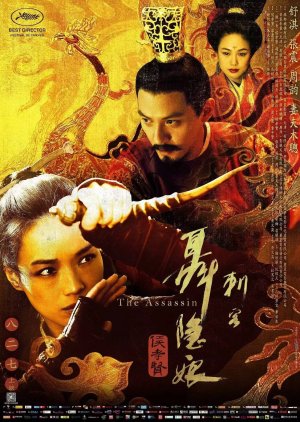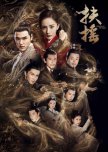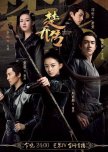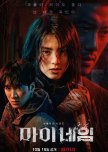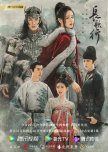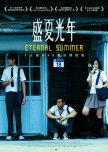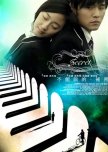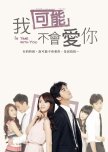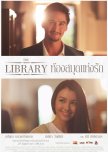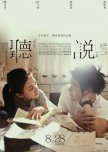
The Assassin is loosely based on the late 9th century martial arts story "Nie Yinniang" by Pei Xing, a core text in Chinese swordsmanship and wuxia fiction.The film is set in 8th century China during last years of the Tang Dynasty. The film centers on Nie Yinniang (played by Shu Qi), an assassin who is directed to slay corrupt government officials by her master, Jiaxin, a nun who raised her from the age of ten. When Yinniang displays mercy by failing to kill during her duties, Jiaxin punishes her with a ruthless assignment designed to test Yinniang’s resolve: she is sent to the distant province/circuit of Weibo in northern China to kill its military governor Tian Ji'an — her cousin to whom she had once been betrothed. I hope that made things clearer for you, cause it helped me.
The story begins in black and white, showing off the skills of our female assassin. She is ruthless and cuts the guys head off in one clean shot – quite impressive. But it’s done so quickly and smoothly that it takes a second or two for us the audience to go ‘Oh he’s dead.’ We then get shown a second side of the assassin where she is ordered to kill a man but refuses to after she finds her target and his son together after spending the day playing with each other. Her refusal to follow an order due to her ‘humanness’ means she gets sent of to kill Tian Ji’an. We then go in to colour, but still maintain a kind of… ‘old’ feel to the movie.
For anyone who is too lazy to read 2 pages worth of writing here’s a basic summary – slow story but pretty things.
First of all I must make it clear that this movie is not one which I can judge as a ‘good’ or ‘bad’ movie. If this movies hadn’t been recommended by a lecturer I met at a university (I’m planning to do Film Studies at uni next year) then I would never had watched, let alone finished this movie. Why? Well mainly – the low ratings are low for a reason. This film is incredibly slow. I don’t mean it drags, I mean it’s REALLY slow. Firstly would probably be the lack of action. With a title such as ‘The Assassin’ one would expect lots of ninja-badass fighting scenes and lots of killing people and stuff. Yeah there isn’t that much of this, I think maybe only 3 or 4 fight scenes in the whole film – not very many in comparison to other action movies. Especially if you think that quite a few of these fight scenes were shot from far distances, giving you a wider scope of the action in contrast to getting up close and personal to the actors – which is the method normally favoured by modern directors. In addition within the fighting which we do see, it’s more like graceful dancing then brutal fighting. If you watch wuxia for the bloodshed and violence, you won’t find it here. Sorry.
There are many long scenes with little talking, I would say that only about 50% of the film is talking, maybe? In addition there is basically no background music, with the director relying on background noises of water, walking, wind, etc. The only music used in this film which has nothing to do with the scene is at the end credits. It’s a good piece of music, but it is quite solitary. With all of these in mind, it does make for quite a boring story. I won’t lie, I got bored. Half way through I did eat my dinner, brush my teeth, and then started researching background information on the movie to see if there was anything interesting I could use to add to this review. There was a little bit. To be honest, I didn’t understand some of the story line – I’m guessing I just missed the crucial parts where they were actually talking or something. I’m reassured when I read reviews on other sites which state that they didn’t understand the story either. I mean, at least I understood what was basically going on.
And then of course we end on a rather anti-climatic ending thinking ‘Now what?’, but I won’t spoil it for you.
But..
Yes there is a but; a big but.
What makes this film good is not the acting or the story, but the cinematography. This film is f***ing gorgeous. I’m not surprised that Hou Hsiao-Hsien, the director, won a ‘Best Director Prize’ for it. Not only do they make large use of Chinas beautiful landscapes, but they also use a lot of techniques seen in ‘old’ films. I’m not sure whether or not that is a legitimate ‘style’ but there are a lot of similarities.
Here are the reasons I like this film/find this film interesting:
1) The landscapes – obviously. There are many lingering shots of the landscapes all around rural areas of China, Mongolia and such. Director Hou (What am I meant to address him as?) has said in interviews and such that they aimed to shoot at high altitudes because there was no civilisation there. This of course means that you get to see beautiful rolling fog and ever changing weather. I believe that the weather and such was not planned for and they just went along and filmed with what whatever weather was happening at the time. I thought that this made it much more natural, compared to the controlled and precise movies of today.
2) The fight scenes are believable. Unlike most Wuxia films we don’t have people legitimately flying left right and centre. Not gonna lie – I hate that style. In this movie I think I saw only one or two instances where he uses this, but prominently the shots and choreography is either at a far view point or… not as close as most modern fight scenes… but near enough that we get a jist. We see interaction and faces, which we don’t normally see in the ‘quick-cut’ action scenes we’re used to. It’s nice.
3) The child actors – bless them. I’m convinced that they didn’t hire any children actors and those that were featured were accidentally brought to the set one day and somehow got dragged into it. They kids just sit, play and run around as if there are no cameras. It’s awesome. Plus it looks very natural.
4) The lighting. Director Hou tried to make the lighting as natural as possible (seeing a theme here yet?). If it was day time he would try and use the outside light, if it was night time then he would make it look as much like candle light as possible. This use of natural lighting resulted in a lot of warm colours, which made me happy inside.
5) Long scenes. But isn’t that a bad thing?! Yeah. Probably. Kind of. Some scenes go on for too long, but it works in some cases. There was one scene were we see tree tops for about 20 seconds. Time yourself and stare at a wall for 20 seconds, it’s a long time. It does work better when he lets us star at rural scenes in a village for a while, or the landscape shots – they’re pretty. In addition the long scenes do also mean we aren’t cutting every 5 seconds when ever a new person talks, which brings me to the next point.
6) Composition. One of the keys to a good movie is composition. And boy does this film have some sweet composition in its frames. In some cases we get shots of a setting and then go straight into talking – this means we don’t have to have as much talking and can carry on looking at pretty things. Or we have the scenes were the camera is handheld and moves around the set from one speaker to the next – no cutting (I love this so much). We have symmetry, symbolism, thirds, etc. It’s just gorgeous. It makes me want to sit down and screen shot frames to analyses what’s in them and what it could mean, my inner English student is trying to escape!
7) The last thing which made this film so interesting is movement. In most scenes there is something moving. There are curtains, wind, fog, birds, servants, candles, even the characters themselves shift and move to make them selves comfy. I feel like maybe Director Hou has gained inspiration from Akira Kurosawa, a Japanese director. I saw this movie but I couldn’t stop thinking about the fact that they share this quality. It’s such a good idea. It makes it so that your eye is distracted and entertained whilst nothing happens in a scene. Absolute genius! I love it!
Ahh. I hope you can see why I found it so hard to evaluate whether this movie was good or bad! Yes it’s a bit dull but it’s so well made! I would say that I probably wouldn’t recommend this to anyone looking for a good story. However, if you are interesting in movies as an art, or can appreciate a well made movie then this is a good movie for you! If you think you can struggle through the slow pace then you are welcome to try it, as long as you can realise that it’s not a bad film. It’s just that the main focus is not on the story itself but the presentation of the story. The idea that the director is trying to convey. I truly think that the rating of the movie at the moment (6.2) is a bad representation of the movie. This movie is all about subtleness, be it in the detail, symbolism or the music.
I don’t know. Try it yourself and see what you think. Just watch it with a pinch of salt.
Questa recensione ti è stata utile?

Instead, it is more for those who want to see a film and appreciate cinema as an art form. Hsiao-Hsein makes use of cinematic beauty to tell his story which is loosely based on the 9th century story, Nie Yinniang. It's a turtle's pace story that drags its viewer on. With long cuts to wide angles to old school panning, Hsiao-Hsein channels in traditional storytelling. There is a lot of ambiance shots, little dialogues and more expression to move the story forward. As a viewer, you focus on the cinematic beauty. It's a cinematic ballad of Asian context.
True enough, it might be difficult for people to follow the plot. The summary might even be misleading because I see no romance here. Instead, I see more of an exploration of one's identity but perhaps a little too less. The lack of dialogue is overshadowed by the overwhelming amount of wide setting shots that makes you, the viewer decide most of what happens. There is little close-up of characters so you are in total control when it comes to interpretation.
The Assassin's strongest feat is definitely it's visual allure that explores the power of stillness (through the cinematography) and silence (through the lack of dialogue and use of music) that brings an unease tension, excitement and anticipation. It's almost as if you're watching a poetic piece, embedded in mystery all the while embodying precise movements and careful gestures that speaks to the camera. The lack of dialogues amplifies the action creating literature-like atmosphere.
Shu Qi reminds me of Chinese actress Zhang Ziyi, her movements are so graceful and full of clarity. Her stone-cold face and unstained expressions just captures the assassin role so well. Hsiao-Hsien won Best Director in Cannes for this film and also swept 8/9 awards in the Asian Film Awards among others. In the end, it's really the ice-pole pace and the uninteresting characters that'll make you keep it at arm's length.
Questa recensione ti è stata utile?

Questa recensione può contenere spoiler
The Assassin breaks out of the standard martial arts mold. If you are looking for a fast paced, bloody, high flying wuxia film, this is not that film. Every shot is a breathtaking painting, lovingly lingered over to give you time to sink into it. Crickets and birds provide most of the natural soundtrack. The strength of this movie lies in the stunning cinematography and the slow, deliberate pacing.
While the times are complex, the main story arc is deceptively simple. Duty or morality? To kill or not to kill?
Nie Yin Niang (Shu Qi-So Close) has been trained for thirteen years as an assassin and is unmatchable. After refusing to kill an official in front of his son her teacher sends Yin Niang to her home province to kill Tian Ji’an (Chang Chen-Crouching Tiger, Hidden Dragon), the military governor, who also happens to be the man she had once been betrothed to before fate and politics changed her plan.
Yin Niang spends much of her time observing from rafters and in dark corners. Is she watching the life that once might have been hers? Or taking the measure of the man and situation to decide whether she can and should kill him?
Dialogue is sparse which can make this movie frustratingly enigmatic for those of us who are not familiar with this ancient tale. Yet I was never bored. Shu Qi gives an understated performance that is complex and compelling in its resolute silence. Yin Niang is no one’s victim and takes history into her own hands.
Fight scenes are often short with no complicated wire work. One scene in particular is beautifully shot among the trees. Yin Niang wields her curved blade confidently and dispassionately against her female opponent before walking off in the forest.
The costumes and sets are lush and a pleasure for the eye. Panoramic scenes of mountains and fields often take center stage. The attention to detail in every frame is captivating.
Yin Niang’s teacher says her heart lacks resolve because the way of the sword is pitiless. This assassin has plenty of resolve, she simply chooses what she wishes to fight for.
Questa recensione ti è stata utile?

Was to boring for me
Completely boring to many scenes where nothing happened, prolonged silence, short dialogue. This was making me really annoyed. It was to artisy for my liking, the change of filters between some scenes, black and white 1st and to color. If you dont mind a super slow paced film give it a chance but i dropped it after 16 mins. I really tried giving this film a chance but I couldn't bare the silence. All you hear is nature with some acting by the actors this didn't really have background music. I wished they had more dialogue to keep me intrested.Questa recensione ti è stata utile?
It's based purely on cinematography. The colors and locations are beautiful.
They give a synopsis of what the movie will be about but it doesn't seem like they stick to the plot. Mainly because of all the long pauses, ambient sounds and little to no dialogue. At some points I thought the movie froze because of the long pauses.
I'm not sure why they even called this movie The Assassin because there's hardly no fighting scenes! I mean a woman assassin and this is all we get??
Alas I digress. I couldn't take this movie anymore.
Questa recensione ti è stata utile?

Stunningly beautiful but frustratingly slow.
If you're in the mood for beautiful artistic 9th century style, long takes and a complicated story in a slow film, then The Assassin is probably your cup of tea. If you want to see a cool martial arts movie - Watch something else.When you see The Assassin you are faced with the age-old question: What makes a good movie? Some prefer a strong story, others powerful effects. Here, a story that arouses no great interest is combined with an artistic style that is unlike anything else.
For those who follow the story, it is about a female assassin in 8th century China. Like many assassins on film, she is faced with the classic dilemma of having her loved one killed or failing her duty, something that meant slightly greater consequences at the time.
If you are looking for a juicy story, you need to have both a lot of concentration and patience, because the director Hou Hsiao-hsien is hardly someone who prioritizes pace, forward-looking lines or clear character development. We're talking sometimes forever-long takes, extremely sparse or no dialogue and scenes that work more like art installations.
Undoubtedly, it is a stunningly beautiful film. The environments, the scenography, the costumes - Almost every single frame is like a painting or the most delicious photograph you've seen on a cinema screen. One could practically watch the film without sound and admire the impressive work of the film's creative team.
With that said and the cool visual style aside, it's a frustratingly slow film to get through. As a contrast to the often overly clear film narration in, for example, American cinema, this becomes almost incomprehensible and unnecessarily complicated.
The fight scenes are the highlights - Not because it's exciting but because of the quiet and calm style. But it's still one of the most boring martial arts movies out there. It is a perfect example of "see but not feel" - Gentle on the eyes, but you leave the salon with a slightly empty and unsatisfied feeling.
Questa recensione ti è stata utile?

Questa recensione può contenere spoiler
3 hours of glorious visuals and natural music without the intrruption of the plot!
First I must say that this movie is beautiful, colour palettes, set designs, outside sceneries, everything are mesmerising and so striking. Movie has a one linear plot: "A trained assassin shows heart in a mission, then is sent to kill her former betrothed/cousin." And this is practically the whole story.One glaring thing about this movie is that it's slow, I mean really slow. While I was watching, more than once I noticed a scene has been still for too long and I thought that accidentally I'd paused the video only to see it's playing (*,*) Dialogues are far and between and when a character is talking, he/she speaks sentences with a several seconds pause in-between. Because of the nature of the movie subplots and details are hard to grasp. Acting is superb, they show their characters inner struggles by body language relatively well. All in all even if you don't follow the plot and story, it's a beautiful background while you do your work!
Questa recensione ti è stata utile?

